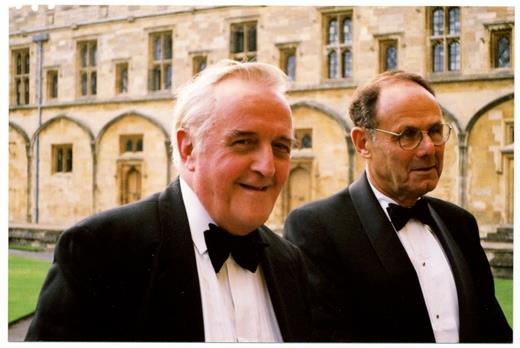Pictured: Dr. David Weatherall (left) and Dr. David Nathan (right).
Pictured: Dr. David Weatherall (left) and Dr. David Nathan (right).
My dear colleague, Regius Professor Sir David J. Weatherall, MD, FRCP, FRS, founder of the Weatherall Institute of Molecular Medicine at Oxford and recipient of the Lasker-Koshland Award for Special Achievement in Medical Science and the Wallace H. Coulter Award for Lifetime Achievement in Hematology, died on December 8, 2018, at age 85 following a damaging fall.
David leaves his lovely wife Stella; his fine son Mark, an excellent neurologist; and his five grandchildren, Lauren, Monty, Theo, Raphael, and Sebastian. He also leaves his most powerful heritage, the outstanding Dr. Doug Higgs, and scores of other trainees whose contributions amplify his remarkable achievements. He is deeply mourned by all of them and by his loyal assistant Liz Rose, his colleague in international hemoglobinopathy management Dr. Nancy Olivieri, and by the community of hemoglobinopathy scholars of which he was the leader.
I have been a close friend and deep admirer of David since the early 1960s when he was at Johns Hopkins working with the estimable Dr. John Clegg on a method to separate the alpha from non-alpha chains of hemoglobin. I, too, had seen my first case of thalassemia in the late 1950s and was filled with curiosity. David’s inquiries, together with the pioneering clinical and diagnostic laboratory studies of Drs. Ceppelini, Siniscalco, and Fessas were my guiding lights. He began his investigative career in 1960 with his first paper, a description of thalassemia in a Gurka family. After that, he published 565 articles largely on hemoglobinopathies. His multi-editioned book with Dr. Clegg, The Thalassaemia Syndromes, became the bible of the field. He wasn’t content to restrict himself to genetic diagnoses. His training program investigated iron chelation therapy to great effect, and his laboratory was the main UK source of prenatal diagnosis of thalassemia and sickle cell disease. With Dr. Geof Pasvol, David made insightful studies of the interaction of P. falciparum with cord blood and sickle cell trait erythrocytes. With Dr. Nancy Olivieri, he established a remarkable diagnostic and therapeutic thalassemia program in Sri Lanka, and with Dr. Doug Higgs, he explored and defined the many faces of the congenital and acquired α thalassemia syndromes. Their explanation of the pathophysiology of combined mental retardation and hemoglobin H disease was a tour de force of clinical research.
David and his fine colleague Dr. Bill Wood envisaged that the answer to thalassemia and sickle cell disease lies in manipulation of the fetal switch. We both lived to see that nirvana approaching fruition. David’s trainee Dr. Swee Lay Thein identified the BCL11A gene as a possible site of influence on F cell levels in humans, an observation that has massively advanced all the way to preliminary clinical trials.
As our friendship ripened and our voluminous correspondence grew (archived in the Center for the History of Medicine at Harvard Medical School), I came to appreciate David’s marvelous, gentle, but lancinating humor. My colleagues regularly planned important birthday parties for me with the hope that he would come to speak at them. On one occasion (I believe my 70th birthday), he weaved a tale about meeting the customs officer in the Logan Airport in Boston who asked the purpose of his trip. David claimed, “to speak at the 70th birthday of Dr. Nathan.” Then David adopted the perfect Boston accent of the customs officer and reported to the delighted partiers that the officer asked, “Why? Can’t they find anyone local to speak nicely about him?”
Former United States Supreme Court Justice David Souter famously stated that a friend is someone whose marvelous characteristics you may desire in yourself but find only in the friend. In that sense and in many others, David Weatherall was a nonpareil friend. I will forever treasure his memory. So will hematology.
— David G. Nathan, MD, President Emeritus, Dana-Farber Cancer Institute, Physician-in-Chief Emeritus, Boston Children's Hospital, Professor of Pediatrics and Medicine, Robert A. Stranahan Distinguished Professor of Pediatrics and the Richard A. Smith Distinguished Professor of Medicine, Harvard Medical School, Boston, MA

